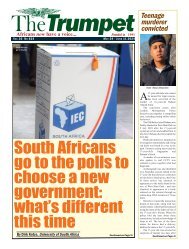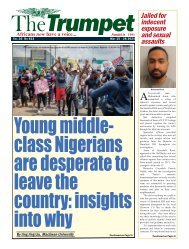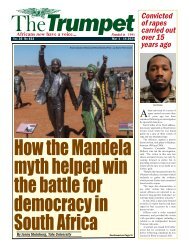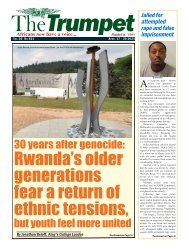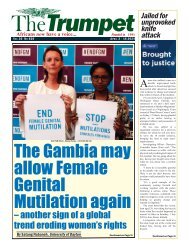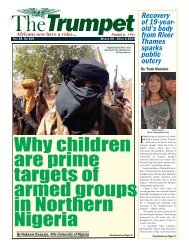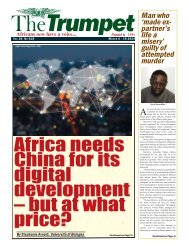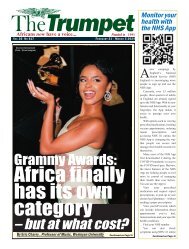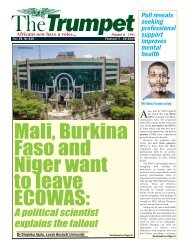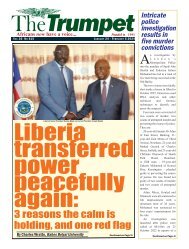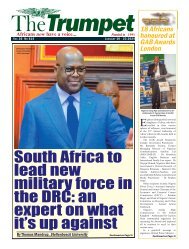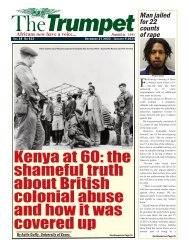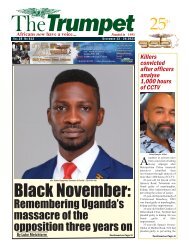The Trumpet Newspaper Issue 552 (August 25 - September 7 2021) - USA Edition
Extra $20m towards wellbeing of children in Somalia
Extra $20m towards wellbeing of children in Somalia
- TAGS
- nigeria newspaper europe
- nigeria newspaper canda
- nigeria newspaper usa
- nigeria newspaper uk
- african newspaper canada
- african american newspaper
- african newspaper usa
- african newspaper uk
- black newspaper uk
- black newspaper usa
- black newspaper britain
- britain black newspaper
- trumpet usa
- trumpet magazine usa
- trumpet newspaper usa
- somali children
- somalia
- ahmed bola tinubu
- nigeria
You also want an ePaper? Increase the reach of your titles
YUMPU automatically turns print PDFs into web optimized ePapers that Google loves.
Page6 <strong>The</strong><strong>Trumpet</strong> AUGUST <strong>25</strong> - SEPTEMBER 7 <strong>2021</strong><br />
Opinion<br />
2023: Tinubu vs Bello and others<br />
BY REUBEN ABATI<br />
From what we have seen and heard so<br />
far, it seems most likely that the race<br />
for the 2023 Presidential position<br />
would end up as the fiercest, most<br />
contested, and perhaps the most<br />
controversial since Nigeria’s return to<br />
civilian rule in 1999. We all must keep an<br />
eye on 2023. In 1999, President Olusegun<br />
Obasanjo emerged not because he was a<br />
known, seasoned, politician but because the<br />
country needed a pair of steady hands and a<br />
strong character, with the right connections<br />
and experience to save the faltering ship of<br />
State, and move the country beyond the evil<br />
annulment of the 1993 Presidential election.<br />
Obasanjo delivered. But he ran into troubled<br />
waters with his succession plans: the<br />
politics of Third Term, the bitter quarrel<br />
with his Vice President, Alhaji Atiku<br />
Abubakar, and his open endorsement of<br />
Alhaji Umaru Musa Yar’Adua, whose<br />
health status and eventual death in office<br />
defined the highest office of the land.<br />
President Goodluck Jonathan who<br />
succeeded his boss, Yar’Adua was a<br />
collective product of the law, and the<br />
majority insistence on what was right. His<br />
Presidency was a turning point and a major<br />
historic landmark for Nigeria, an<br />
affirmation that Nigeria could also be a land<br />
of dreams where a man of humble<br />
beginnings could rise to the top.<br />
By 2015, the forces of elite conspiracy<br />
and ethno-religious myopism, organised an<br />
acidic campaign against the Jonathan<br />
Presidency and got him out of office. He<br />
was succeeded by President Muhammadu<br />
Buhari, a former military Head of State,<br />
who had sought the Presidency of Nigeria<br />
as a civilian three different times – 1999,<br />
2007 and 2011. In 2015, he was propelled<br />
into office by an electorate that had<br />
embraced his managers’ promise of change<br />
and hope. He was yet another rallying point<br />
for great expectations. In 2023, the<br />
circumstances would be different. <strong>The</strong>re is<br />
Asiwaju Bola Ahmed Tinubu<br />
no coalescing, propelling force, at this time<br />
behind any aspirant, on such a national<br />
scale, and of such a momentum as we saw<br />
with Obasanjo, Jonathan, and Buhari’s cultlike<br />
popularity. And this is why the 2023<br />
Presidency is fast becoming a desperate<br />
gamble, a ‘try-your-luck’ kind of<br />
proposition, without any core basic<br />
agreements. A kind of anybody’s game,<br />
generating tension, so early, so far from the<br />
commencement of the 2023 electoral<br />
process.<br />
<strong>The</strong>re is no consensus on any issue. <strong>The</strong><br />
people of the South East argue, rightly that,<br />
it is their turn to produce the President of<br />
Nigeria. No Igbo man has been President<br />
since 1999, although Igbos have helped to<br />
put others into office. <strong>The</strong>y want the<br />
marginalisation of Igbos to end. <strong>The</strong>y want<br />
it on record that the Igbo race is not inferior<br />
to any other group in Nigeria. Igbos are the<br />
third largest ethnic group in the country.<br />
<strong>The</strong>y have been told by Northern<br />
spokesmen that nobody will offer them the<br />
Presidency on a platter of gold, and that in<br />
any case, they should go and organise<br />
themselves and reach out to other Nigerians<br />
especially now that there is an internal<br />
debate in the South East about identity<br />
politics – who is Igbo and who is not and<br />
who is more Igbo than the other? Many<br />
persons consider this suggestion, an insult!<br />
<strong>The</strong> people of the North East and Central<br />
zones also insist that it is their turn to have<br />
their kinsmen inside the Presidential Villa<br />
and that after the Presidency has gone<br />
round the six geo-political zones, we can<br />
then begin to talk more seriously about<br />
those principles of merit, competence,<br />
knowledge – the same issues the other<br />
privileged geo-political zones never<br />
stretched when the Presidency fell into their<br />
laps.<br />
Constitutional provisions on eligibility<br />
for the Nigerian Presidency are stated in the<br />
1999 Constitution. <strong>The</strong>re is no mention of<br />
ethnicity or geographical zone, although<br />
Section 14(3) and (4) mention Federal<br />
Character, diversity, unity and justice. <strong>The</strong><br />
two major political parties have since<br />
agreed on an unwritten code of Rotational<br />
Presidency, but this is beginning to look<br />
more like a tool of political expediency.<br />
Ahead of the 2023 general elections,<br />
Nigeria’s two major political parties – the<br />
Peoples Democratic Party (PDP) and the<br />
All Progressives Congress (APC) are both<br />
engulfed in crises that could be counterproductive.<br />
<strong>The</strong>re is no clarity on both sides<br />
about how the 2023 process could be used<br />
to address the people’s concerns. Not even<br />
the National Assembly is serious about the<br />
provision of an electoral framework that can<br />
inspire trust and confidence. In <strong>2021</strong>,<br />
Nigeria’s 9 th National Assembly, dominated<br />
by the ruling party, voted to prevent the<br />
adoption of electronic transmission of<br />
election results. <strong>The</strong> Independent National<br />
Electoral Commission (INEC) says it is<br />
possible and doable, the politicians<br />
disagree. In smaller, neighbouring African<br />
countries, electronic transmission of results<br />
is not a problem. In Nigeria, it is a source of<br />
crisis.<br />
But what I find even more disturbing is<br />
the bad rhetoric that is beginning to build<br />
up, the high velocity intolerance and the<br />
threat of violence that hang dangerously in<br />
the air, and the refusal of some emergent<br />
Continued on Page 15





